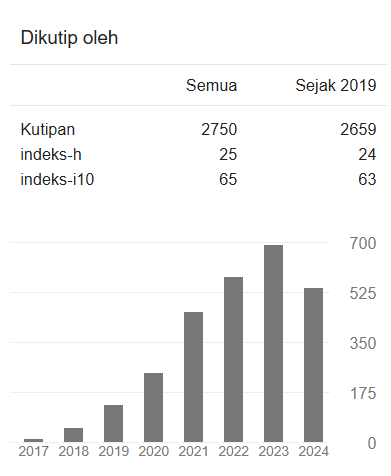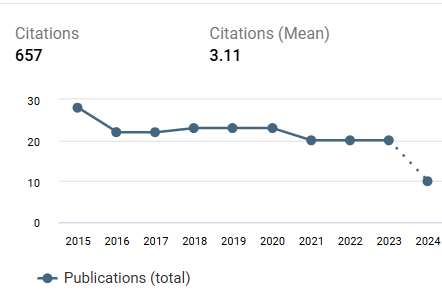PENINGKATAN HASIL BELAJAR BILANGAN BERPANGKAT DENGAN MODEL PROBLEM POSING PADA SISWA KELAS IX SMP NEGERI 4 BATU.
DOI:
https://doi.org/10.22219/jinop.v3i1.3826Keywords:
Increase of study result, Exponential numbers, Problem PosingAbstract
ABSTRAK
Masih kurang minatnya siswa dalam belajar khususnya pelajaran matematika, salah satu sebab adalah metode yang digunakan oleh guru masih konvensional dan siswa bekerja secara individu, sehingga siswa yang kurang mampu kesulitan dalam memahami konsep dengan benar.Tujuan dari penelitian ini adalah untuk meningkatkan hasil belajar bilangan berpangkat dengan model problem posing pada siswa kelas IX SMP Negeri 4 Batu.Penelitian ini menggunakan desain Penelitian Tindakan Kelas (Classroom Action Research), pendekatan yang digunakan dalam penelitian ini adalah pendekatan kualitatif yaitu penelitian yang datanya tanpa menggunakan teknik statistik. Penelitian tindakan kelas ini dilaksanakan dalam dua siklus. Setiap siklus terdiri dari perencanaan, tindakan, observasi dan refleksi.Berdasarkan data yang diperolah dari pelaksanaan tindakan mulai siklus 1 sampai dengan siklus 2 dan berdasarkan hasil observasi tiap-tiap siklus terjadi peningkatan prestasi yaitu siswa yang mendapat nilai kurang dari KKM dari 17 siswa menjadi 7 siswa, mengalami peningkatan siswa yang mendapat nilai memenuhi KKM dari 18 menjadi 27 siswa, dan rata-rata tes siswa dari 62,29 menjadi 71,76 mengalami kenaikan 2,47%, serta prosentase ketuntasa juga mengalami peningkatan dari 48,6% menjadi 79,4% meningkat 30,8%.Hal ini menunjukkan bahwa dengan pendekatan model problem posing dapat meningkatkan hasil belajar siswa khususnya pada materi bilangan berpangkat.
Kata Kunci: Peningkatan hasil belajar, Bilangan berpangkat, Problem Posing
ABSTRACT
The lack of student’s study interest especially on mathematics, one of the reason is the method is still conventional and students work individually, with the result that students harder to understanding the concept correctly. The purpose of this research is improving learning outcome on exponential numbers with problem posing model in 3rd years students on State Junior High School Batu. This research using Classroom Action Research design and qualitative approach, which is the research that not using statistics technique. This Classroom Action Research executed in two cycle. Every cycle consist of planning, action, observation, and reflection. Based on data that obtained from the 1st cycle until 2nd cycle and based on observation from every cycle there is an achievement increase that is students that having under the minimum learning mastery standard from the initial is 17 students increase to 7 students, then there is increase the numbers of students that having on the minimum learning mastery standard from 18 to 27 students, and the average of students’ test from 62,29 to 71,76 (increasing 2,47%), so the percentage of learning mastery increased from 48,6% to 79,4% increase for about 30,8%. This shows that Problem Posing approach can increasing student’s study result especially on exponential numbers subject.
Keyword: Increase of study result, Exponential numbers, Problem Posing
Downloads
Downloads
Published
How to Cite
Issue
Section
License
Copyright Notice
Authors who publish with JINoP (Jurnal Inoasi Pembelajaran) agree to the following terms:
- For all articles published in the JINoP (Jurnal Inovasi Pembelajaran), copyright is retained by the authors. Authors give permission to the publisher to announce the work with conditions. When the manuscript is accepted for publication, the authors agree to the automatic transfer of the publishing right to the publisher.
- Authors retain copyright and grant the journal the right of first publication with the work simultaneously licensed under a Creative Commons Attribution 4.0 International License. that allows others to share the work with an acknowledgment of the work's authorship and initial publication in this journal.
- Authors are able to enter into separate, additional contractual arrangements for the non-exclusive distribution of the journal's published version of the work (e.g., post it to an institutional repository or publish it in a book), with an acknowledgment of its initial publication in this journal.
- Authors are permitted and encouraged to post their work online (e.g., in institutional repositories or on their website) prior to and during the submission process, as it can lead to productive exchanges, as well as earlier and greater citation of published work (See The Effect of Open Access).








